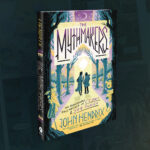TGC’s critical theological engagement with art and media should not be construed as endorsement or recommendation. TGC often discusses movies, TV shows, and other forms of art primarily because they have explanatory power in helping us understand the culture we’re trying to reach. Before you make a decision to watch any piece of media, we recommend reading “Should I Watch This?” and checking out a content guide.
“Who am I?” existential musings have long provided rich fodder for cinematic drama. But recently in Hollywood, the drama of a character’s self-discovery has morphed into an all-consuming obsession. “Drama” has come to consist less in what characters do or have done to them and more in who they discover or assert themselves to be.
This is especially true when the “who” identity negotiations concern politicized identity categories like sexuality, gender, and race. Hollywood is increasingly eager to foreground these stories.
Yet for all the merits of depicting diverse characters (and this is one of the great potentials of moviemaking), when identity politics becomes a dramatic end unto itself, movies tend to suffer. Instead of being virtuous, compelling, endearing, or heroic, modern film protagonists tend to be tortured by questions of identity, annoyingly self-referential, and generally boring. They’re flattened by directors and screenwriters who sacrifice compelling character at the altar of identity politics.
In many movies today, ‘drama’ has come to consist less in what characters do or have done to them and more in who they discover or assert themselves to be.
Consider three of this year’s Academy Award best picture nominees: Maestro (seven nominations), Barbie (eight nominations), and American Fiction (five nominations). I found things to like in each but generally consider them frustrating examples of this trend. While the protagonists are ostensibly meant to complicate our categories of sexuality (Maestro), gender (Barbie), and race (American Fiction), in the end, they’re wholly defined by these categories, their personhood reduced to a solitary dimension that serves the interests of “the discourse” more than the entertainment or edification of the audience.
This is tragic. It’s tragic because it flattens characters into boring “viewpoint pawns” and leaves more interesting dimensions of their humanity unexplored. But it’s also tragic because it reflects a society where the inordinate focus on identity—and the reductive formulas therein—represents a real pressure and crushing burden. Contrary to what these films suggest, young people today need to know that the greatest drama in life isn’t the discovery and expression of one’s “true self” from within the identity matrix of sexuality-gender-race.
Maestro’s One-Note Symphony of Sexual Identity
When I watched Maestro, Netflix’s “prestige” biopic about Leonard Bernstein (played by Bradley Cooper, nominated for best actor), I’d hoped to learn more about the origins and nature of the famed conductor and composer’s musical genius, including how his Jewish faith informed his art. I’d expected to learn about his place in American music history. Instead, I mostly just learned about Bernstein’s gay sex life and how it affected his openly nonmonogamous marriage to Felicia Montealegre (Carey Mulligan, nominated for best actress) as well as their three children.
From the opening scene (in which we first meet a young “Lenny” in bed with another man) until the final scenes (in which we see an elderly Bernstein creepily dancing with a young male conducting student, to the music of Tears for Fears’s “Shout”), Maestro is fixated on Bernstein’s sexuality—as if it’s the most interesting thing about him.
Maestro is fixated on Bernstein’s sexuality—as if it’s the most interesting thing about him.
Cooper (who also directs the film) seems to want to paint Bernstein as a “complex” and multidimensional enigma who defies easy categorization. At one point, Bernstein declares, “The world wants us to be only one thing and I find that deplorable.” Yet based on what consumes the majority of the film’s plot, Cooper does want Bernstein to be only one thing: his sexuality. And in making the film about that (Bernstein’s carnal exploits), Cooper ends up flattening an interesting character and sucking the story of its true drama. Here’s how Michael De Sapio put it in his reflection for The Imaginative Conservative:
What makes a Leonard Bernstein unique and sets him apart is his art, not his personal sins and infidelities, by virtue of which he resembles millions of poor souls the world over and which, therefore, are uninteresting as the main subject of a movie. True, Bernstein’s double life, his tragically divided self—happily married yet pursuing homosexual affairs on the side—and how this affected his public life as an artist is definitely of moral and psychological interest. But by putting this conflict front and center and slighting what truly made Bernstein who he was in his core—his musical mind and passion—the filmmakers ultimately lose any reason for making (or watching) the film.
While many cite the Thanksgiving argument scene as the standout moment in Maestro, for my money, the best scene occurs when we watch Cooper-as-Bernstein conduct the finale of Mahler’s “Resurrection” Symphony No. 2 in a stirring recreation of a London Symphony Orchestra performance at Ely Cathedral in 1973. Set in a towering cathedral and featuring Cooper going for broke with Bernstein’s full-bodied conducting mannerisms, the scene briefly centers the movie on a masterful artist’s pursuit of aesthetic transcendence, rather than his far-less-interesting sexual sins.
It’s possible to make riveting biopics without focusing on the central character’s sexuality. Consider Capote, for which Philip Seymour Hoffman won the best actor Oscar for portraying Truman Capote. While Capote’s homosexuality is certainly part of the character, it’s in no way the focal point of the film (which finds the writer’s literary craft more interesting). Countless other biopics have managed to present thoroughly fascinating human characters without once having to depict their bedroom habits.
Flattened Characters in Barbie and American Fiction
Though Greta Gerwig’s Barbie is a different sort of film than Maestro, it shares a fixation on identity politics (in this case, gender). The central protagonists—Barbie (Margot Robbie) and Ken (Ryan Gosling), along with all the other Barbies and Kens in the film—are preoccupied with how gender does and doesn’t define them. They spend the film wrestling with feminism, the patriarchy, and how men and women should relate to one another.
Both Ken and Barbie want to break out of boxes (sometimes literally) and aspire to robust humanity beyond stereotypes or consumer expectations. But Gerwig’s film keeps them in the box by flattening their characters into the singular dimension of gendered identity. To be sure, gender is a dimension of every man’s or woman’s life—and a rich one at that. But it’s not the only dimension. For the characters of Barbie, however, it seems like the only dimension worth exploring.
The online fury surrounding Ryan Gosling’s Oscar nomination as Ken (when Robbie didn’t get nominated for best actress and Gerwig failed to make the cut for best director) proves how much the film and the discourse it spawned is fixated on gender. Few are talking about the merits of Gosling’s performance or why exactly Robbie’s performance was worthy of best actress, only that he’s a man and she’s a woman. The fact of their gender overshadows the merits of their performances.
In American Fiction, meanwhile, it’s not gender but race that centrally defines the protagonist. Jeffrey Wright (nominated for best actor) plays Thelonious “Monk” Ellison, a professor and novelist who intentionally crafts a career as a “writer who happens to be black” rather than a “black writer.”
The jokes in the satirical film arise when Monk realizes he can sell more books when he writes the sorts of gritty, underrepresented #blackstories affluent liberal audiences want to buy to help absolve their guilt. And so he jokingly sends his agent a manuscript—My Pafology—full of black suffering, trauma, and expletive-laden “authenticity.” It ends up landing him his most lucrative book deal yet, prestigious literary awards, and a Hollywood movie adaptation.
Fiction occasionally contains sharp satire, but in the end, it reduces Wright’s character—however much he wants to be uncategorizable—into a role boxed in by racial categories. Even when he’s trying to subvert expectations and break stereotypes in his work and his life, Monk’s identity is nevertheless fundamentally in conversation with racial discourse.
While this is certainly a part of who he is, I left the film with so many questions about what else defined him. What inspired him to become a writer? What defines his art? What are his primary intellectual interests? What are his chief goals in life? Much like Maestro, American Fiction suggests the most interesting thing about its artistic protagonist isn’t what he does or makes but the marginalized identity that must define him. At one point, Monk decries the audience’s hunger for black books that “flatten our lives.” It’s an understandable frustration, but sadly, Fiction inflicts the same flattening on Monk himself.
Another character in Fiction—Monk’s brother Cliff (Sterling K. Brown, nominated for best supporting actor)—is gay, having divorced his wife to run off with male lovers. As with Monk, we know little about Cliff’s interests, passions, or life’s work (other than that he’s a surgeon). The main thing we know about Cliff is that he’s gay. In one tragically telling line, Cliff laments to Monk that their father died before Cliff could come out as gay: “He never knew the entirety of me.” How sad that, for Cliff, his gay identity signals a completion of himself. But this illustrates the warped imagination—and reductive vision of human identity—on display in these films.
Again, there are countless examples of films where the gender or race of a character matters significantly but isn’t all-consuming or entirely defining of that character. In last year’s Oscar-nominated The Banshees of Inisherin, for example, the male gender of the two lead characters (Colin Farrell and Brendan Gleeson) matters hugely, as the fragility of male friendship is a big part of what the film explores. But being men isn’t the only thing that defines these characters and it’s not something they spend any screen time talking about.
Wright is a great actor who has played many roles where race is part, but far from all, of the character’s identity. The characters he plays in Wes Anderson’s The French Dispatch and Ang Lee’s Civil War drama Ride with the Devil are a few examples. Wright’s black skin color isn’t incidental or unimportant in those films, but it’s not the defining attribute.
More Compelling Identity
Films like Maestro, Barbie, and American Fiction—with characters flattened into flannelgraph humans on a didactic felt board of identity politics—are symptomatic of a culture with a weak, unstable anthropology. In a secular age, there’s little consensus on what constitutes “being human,” so the question becomes largely subjective.
In a secular age, there’s little consensus on what constitutes ‘being human,’ so the question becomes largely subjective.
The onus is on each individual to (1) determine who he or she wants to be, (2) become that person, and (3) express it in the world in a unique way. But this threefold identity construction project is less an opportunity than a heaping burden. It becomes an all-consuming project of life (and culture, as seen in these films): a constant inward pursuit and outward performance that leaves individuals anxious and exhausted—“weary of the self” as Alain Ehrenberg puts it.
Christianity offers a better way. To be a follower of Christ is to belong to Christ (Eph. 2:13). We are not our own (Rom. 14:7–8). The most important, interesting, and life-giving thing about us is . . . Christ in us (Gal. 2:20). This isn’t to say our distinctive physical or cultural attributes don’t matter. They do. They’re just not as ultimate or definitive as pop culture would have us believe.
A Christian’s identity isn’t something to constantly create and re-create, justify and rejustify. It’s an identity forged by the Holy Spirit and hidden with Christ in God (Col. 3:1–13). In Christianity, a “new self” isn’t a prize we endeavor to win. It’s a gift we graciously accept. And this new identity is the best one possible, not because it’s modeled after a privileged race or gender, or some identity marker of fleeting cultural cachet, but because it’s “created after the likeness of God in true righteousness and holiness” (Eph. 4:24).
Try Before You Buy: FREE Sample of TGC’s New Advent Devotional

Choosing the right Advent daily devotional can be tough when there are so many options. We want to make it easier for you by giving you a FREE sample of TGC’s brand-new Advent devotional today.
Unto Us is designed to help you ponder the many meanings of this season. Written by TGC staff, it offers daily Scripture readings, reflections, and questions to ponder. We’ll send you a free sample of the first five days so you can try it out before purchasing it for yourself or your church.

































